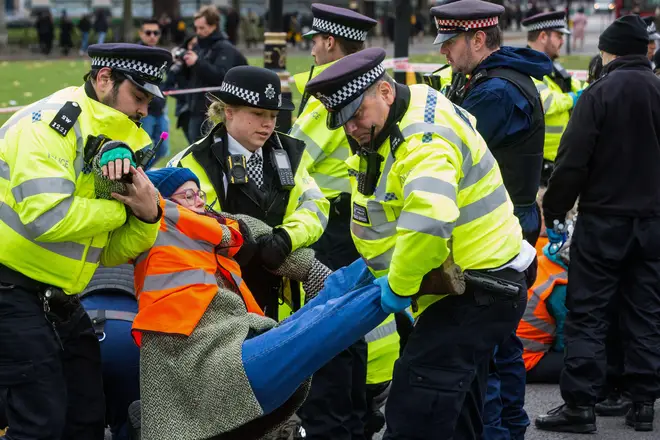
Clive Bull 1am - 4am
14 November 2021, 00:00 | Updated: 14 November 2021, 06:29

Tougher punishments that could see Insulate Britain demonstrators jailed for causing major disruption on the country's roads are to be unveiled to Parliament.
The changes will be tabled on Monday in the House of Lords, with protesters facing six months behind bars and slapped with an unlimited fine.
Police will also be given greater powers to tackle offenders who they suspect could be about to block or glue themselves to roads, trains, planes and other vital infrastructure, in amendments to the Police, Crime, Sentencing and Courts Bill.
It comes as Insulate Britain protesters - dubbed "irresponsible crusties" by Boris Johnson - continue to cause misery for motorists as they relentlessly block major roads during rush-hour.
The group recently took their protests nationwide, disrupting drivers in Manchester and Birmingham, as well as parts of London.
Roads targeted by the group include the M25 around London, the M56 in Manchester and the A4400 in Birmingham, among others.
Read more: Eco protesters tell court they feel 'bullied' as £900k cost of blockades is revealed
Read more: Extinction Rebellion activists block UK's largest oil refinery and scale silos

Furious drivers turn violent at eco-mob
Policing the protests has already come at a huge cost - with the Met Police wasting nearly £2m in the first four weeks of the group's activity, and total arrests reaching nearly 850 to date.
The Home Secretary Priti Patel said it was "right" that those who "choose to pursue a path of anti-social, dangerous disruption" faced the prospect of a prison sentence as punishment.
The clampdown on the "guerrilla" tactics of the likes of Extinction Rebellion and Insulate Britain were first put forward in September and cited again in the Home Secretary's speech to the Conservative Party conference last month.
The Home Office said the current law, which sets the penalty at a maximum fine of £1,000, was no longer an adequate deterrent for organisations "determined to cause widespread disruption and break the law".
Read more: 'Historic' global climate deal agreed at COP26 after two weeks of tense talks

Insulate Britain say their protests will continue
Ms Patel said "nobody should have unchecked rights to endanger the public and themselves:.
"There are numerous legitimate ways in which activists can peacefully campaign for meaningful change, and it is right that those who instead choose to pursue a path of anti-social, dangerous disruption should face the prospect of jail," she said.
"It is totally unacceptable that police should be spending their days ungluing faces from dangerous roads. They should be in our communities protecting the vulnerable people who need them most.
"That's why our Police, Crime, Sentencing and Courts Bill is so necessary. The public expect everyone in Parliament to stand up for the hard-working, law-abiding majority, stand up for the police and back the Bill."
Other measures due to be unveiled on Monday will include allowing the police to stop and search people where there is a reasonable suspicion they are carrying items intended to cause disturbance by "locking-on" using glue or other means.
Future amendments will also include bringing in "serious disruption prevention orders", which will give the courts the power to prevent an individual with a history of using disruptive measures from attending certain protests in future.
Orders could apply to someone convicted of protest-related criminal offences such as blocking a motorway, or where there is evidence that they have contributed to similar such protests, the Home Office said.